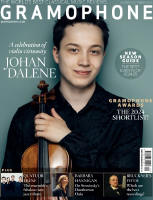Texte paru dans: / Appeared in:
|
|
|
|
|
|
Barbara Strozzi accompanied herself on the lute at various Venetian academies, so there is something to be said for present-day interpreters approaching her arias and cantatas in similarly streamlined ways without recourse to a basso continuo panoply of keyboards, viols, harps, bells, whistles and the kitchen sink. Solmund Nystabakk uses a large chitarrone or a versatile archlute according to the technical requirements and moods of each piece; bass notes and chordal realisations are placed meticulously to allow plenty of textural space for Berit Norbakken’s attractively unforced singing. The Norwegian duo’s subtle poeticism and harmonic finesse suggest that less can be more. Most of the repertoire is from Strozzi’s Cantate, ariette, e duetti, Op 2 (1651). Norbakken’s leaned appoggiaturas, judicious embellishments and controlled exploitation of tuning support refined emotiveness in L’Eraclito amoroso. Pointed irony and supple floridity convey a disdainful rebuke to a treacherous lover (L’amante bugiardo). There is a knowing flirtatious wink when mocking a lovesick young man obsessed with the desirable Clori (La fanciuletta semplice). A lover desperate to keep his weakness hidden in L’amante segreto features a bittersweet love song over a descending four-note ground bass that is akin to Nerone and Poppea’s duet at the close of L’incoronazione di Poppea, although Strozzi explores darker chromatic tensions. A girl’s mockery of Cupid’s futile endeavours has nonchalant wittiness (Lilla crudele ad onta d’amore) and there is sparky humour in Chiamata a nuovi amori – surely Strozzi envisaged such sardonic songs as overtly comedic.
Interpsersed among these are a few cantatas from Diporte di Euterpe, Op 7 (1659). Per un bacio is a throughcomposed lament that a kiss stolen from a beloved must end in death in the noose of a lock from his hair. Non volete ch’io mi dolga? is a young man’s miserable complaint that his lover has told him to stop complaining (he is uttertly oblivious to the paradox, of course). A man’s sorrowful weeping that his beloved Lidia has been locked up by her stern father (Lagrime mie, Lamento) is rendered softly. Throughout proceedings Norbakken and Nystabakk’s crystal-clear lucidity and eloquent artistry confirm Strozzi’s sophisticated compositional ingenuity. |
|




